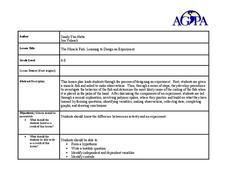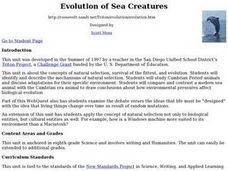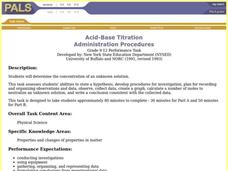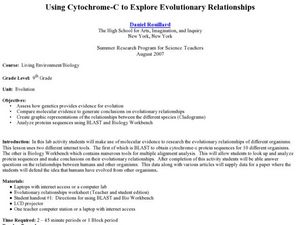Curated OER
Spinning Your Wheels
Students read various articles related to transportation and land use. They cite textual references as they engage in panel discussions, shared inquiry discussions and debates. They write a persuasive essay on the topic.
Curated OER
The Miracle Fish: Learning to Design an Experiment
Students develop procedures to explore the behavior of fish. In this scientific experiment lesson students from a hypothesis, write a question, identify different variables and controls in their experiment.
Curated OER
Make A Plan
In this science learning exercise, students create a plan on what product they will test. They describe what they want to discover about this product and write questions that address the goal of their experiment. Finally, students...
Curated OER
Coat Caper
High schoolers examine pollen and fibers taken from a garment. They analyze pollen from new hybrids and compare it to the samples from the garment then make individual conclusions concerning the specific historical authenticity of the...
Curated OER
A Day at the Beach-Why Did We Do It?
Students investigate pollution at the beach. In this environmental lesson, students participate in a beach clean-up and calculate the weight of the debris collected. Students write a reflection in their journal about their beach clean-up...
Curated OER
Evolution of Sea Creatures
Students identify and describe the mechanisms of natural selection. They study Cambrian Period animals and discuss adaptations for their specific environment.Students compare and contrast a modern sea animal with the Cambrian era animal...
Curated OER
Which Animals Should Be Saved?
Fifth graders investigate the concepts related to the endangerment of different animal species. They conduct research using a variety of resources. The skills of prediction are used to show the possible outcome of the extinction of a...
Curated OER
Introduction to Toxicology
Students explore the science of toxicology and the relationship between a toxic reaction (response) and amount of substance (dose). They observe two demonstrations illustrating the concept of dose-response.
Curated OER
Acid-Base Titration
Students determine the concentration of an unknown solution. This task assesses students' abilities to state hypothesis, develop procedures for investigation, plan for recording and organizing observations and data, collect data, create...
Curated OER
Electric Circuits
Students determine the power dissipated in the combination of two resistors connected in series to a 6 volt battery. This task assesses students' abilities to develop procedures for an investigation, develop a plan for recording and...
Curated OER
Teaching the Scientific Method Using Adhesives
Students research on the history of adhesives. In this science lesson, students select one test to use in finding the stickiness of adhesives. They collect data and formulate a conclusion.
Curated OER
Pros and Cons of Hydroelectric Power
Students develop arguments for and against the construction of hydroelectric power plants. Poll the groups to determine which view dominates in the class and students write a summary of their conclusions.
Curated OER
How Do The Colors of Light Mix?
Students investigate the mixing of light. They form a hypotheses to reason why color changes occur and they write conclusions and ask new questions arising from the investigation. Students identify the primary and complementary colors of...
Curated OER
One Plus One Makes New
Students discover the properties of matter and how they change when composite materials are produced. In this informative instructional activity students write up a question and procedure to an experiment then analyze and draw...
Curated OER
Floating Soap
Students explore the density of soap. In this science lesson, students conduct an experiment to find which types of soap will float. Students make a hypothesis and record their observations.
Curated OER
Taking Care of Your Teeth
First graders discuss the importance of taking care of their teeth while viewing pictures showing good/poor teeth care. In this health and science lesson, 1st graders list 3 things to do to keep teeth healthy, creating a lis on chart...
Curated OER
Fibers Lesson Plan
Students explain how to use a light microscope, describe how to care for a microscope, and solve a forensic science problem, using a microscope to analyze data and draw conclusions.
Curated OER
Fahrenheit vs Celsius
Students construct a thermometer and convert Fahrenheit temperature into Celsius temperature. In small groups, they construct a thermometer, write a paragraph describing how to make a thermometer, and convert temperatures.
Curated OER
Focus on Friction
The students learn about friction and forces through direct instruction and an investigation. They use measurement skills, observation skills, predicting, and drawing conclusions based on data collected during the investigation. Students...
Curated OER
Unknown Element Project
Students work with a partner to determine the identity of an unknown element based on given descriptions. Groups use classroom textbooks, encyclopedias, and science internet sites to identify their unknown element then write a report as...
Curated OER
Using Cytochrome-C to Explore Evolutionary Relationships
Students analyze protein sequences. In this lesson plan on determining evolutionary relationships, students use the Internet tools BLAST and Biology Workbench to look at protein sequences. Students will compose an essay that includes...
Curated OER
What's the Fizz Factor: Mentos in Cola
In this what's the fizz factor: Mentos in cola worksheet, students conduct an experiment using Mentos in several kinds of diet cola and regular cola, writing the hypothesis, recording the results, and writing a conclusion.
Curated OER
Living and Non-Living
Students discover the basic needs of life. In this science lesson plan, students explore how all living things need air, water, food and shelter
Curated OER
Float Your Boat
Students investigate buoyancy, displacement and density. In this flotation lesson plan students study the Archimedes' Principle, analyze data and draw conclusions.























